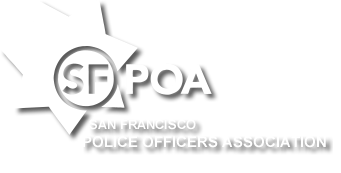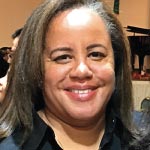On Friday, October 17, 2014, a funeral service was held at Duggan’s Serra Mortuary on Westlake Avenue in Daly City. It was the last opportunity for friends of Gerald (Jerry) Crowley to pay last respects to the one person most responsible for establishing the foundation of the current POA as a powerful and respected labor organization in San Francisco, with influence spreading throughout California. It was the tenacity, determination, and energetic personality of Jerry Crowley and his committed “Blue Coats” that, stone by stone, forged the base and foundation upon which the POA currently stands. How mighty were his efforts, and how quickly are they forgotten. Only about twenty active and retired SF police officers were present to bid farewell to the man who is the cornerstone of the current POA.
The 1975 Strike
While Jerry is most remembered as the leader of the Police/Fire strike of August 18 – 21, 1975, he had established himself as a premier police union/association leader both in San Francisco and in California long before that labor action. His accomplishments continued throughout his POA presidency, which ended in 1979. The strike was a defining moment in the history of the POA. That action (police – 3 days; fire – 1 day) is the only emergency services strike in San Francisco history, and will probably remain so. It was the first police strike in a major U.S. city since the Boston police strike of September 1919.
What forces propelled this most drastic of public sector labor actions? 1975 was an election year. Five well-known candidates were running for the Mayor’s office (John Barbagelata, John Ertola, Dianne Feinstein, Milton Marks, and George Moscone). Six supervisors were running for re-election. In January, the Board of Supervisors was alerted that if they didn’t sharply curtail city spending, an extra $98 million in property taxes would be required to operate municipal government in FY 1975 - 76. Disregarding this advice, the Board proceeded to give 4% to 12% pay raises to its 11,000 miscellaneous city employees. Miscellaneous employees’ average increase was about 6.5%. The Supervisors adopted a new record $707 million budget.
In March, the Board rejected the Civil Service Commission’s recommendations that deputy sheriffs get a 12% pay raise, and decided on a lesser amount. In response, the angry deputies voted 92 to 2 to strike, and the Board quickly worked out a compromise.
By May of 1975, the Board was alerted that police and fire pay increases might be as high as 13%. They began to privately agree to try and hold the raise to 6.5% as a means of saving $6.5 million, even though City Controller John Farrell was predicting a city surplus of $14 million.
In July, the Board approved $10 million in raises for 5,000 city craft workers, compensation that would easily exceed that being paid to police officers and fire fighters. More than 35 other city occupations were paid more than police officers. The annual salary for a police officer was $16,644, and a lieutenant was paid about $19,400. City laborers received almost $17,400; painters $21,200; electricians $21,700, carpenters $21,900, pickup truck drivers $22,000, plumbers $24,200 and plumbers’ foremen $26,600. All of these wage increases were required by prevailing wage formulas.
Annually in August, the Civil Service Commission issued a certification of the maximum allowable rate of compensation for police officers and firefighters based on a statewide survey (California cities with a population of 100,000 or more) of salaries paid to comparable positions. For 23 straight years, the Board of Supervisors accepted this maximum rate. (At the time in 1975, there was no enhanced overtime pay, longevity pay, night differential, dental insurance, uniform allowance, SP wellness payout, or special unit differential pay except for the Solo motorcycle hazard pay.) Each year, regardless of the size of the increase – in some years a large pay increase, while in others a small increase – police officers accepted the use of the formula.
On August 4, 1975, the Commission certification showed a 13.05% maximum allowable ($1,568/month) to give SF officers parity with Los Angeles officers, who were the highest paid in the state. The cost of living had risen 12.4% and police officers felt that a 13% raise was reasonable. They also believed that a high salary compensated for the lack of fringe benefits enjoyed by numerous other jurisdictions. The Police Commission urged the Board of Supervisors to set police salaries at the maximum rate authorized by the Charter.
In early August, in closed caucus, the supervisors, fully focused on their mayoral or supervisorial campaigns, determined to abrogate their 23-year past practice. No 13% raise for police officers and firefighters, it would have to be 6.5%. On July 31, at a candidate’s night sponsored by the POA and Firefighters Local 798, the six incumbent supervisors told the audience of 1,500 police and firefighters that they would not commit themselves to the customary wage formula, citing the city’s economic condition. There would be no public debate and no meetings with the supervisors who had privately agreed to all stand united against the 13% raise.
Hearings on the pay raise were scheduled for August 7, 1975 before the Board’s legislative and personnel committee. At the hearing, the two supervisors present announced that the full board had instructed the committee to listen to the employee groups, but to make no recommendations regarding salaries for police officers and firefighters. An economist hired by the POA and Local 798 addressed the committee about the fairness of a 13% increase in light of other employee wages and increases in the cost of living. The POA also gave the supervisors a 53-page report, prepared by the economist, which supported the continued use of the formula.
The Board of Supervisor’s meeting on the pay increase issue was scheduled for August 18. Prior to this meeting, the POA distributed to its members a survey asking what action should be taken if the Board failed to follow its 23-year past practice of setting police wages. The choices included a strike, a mass sick-in, or nothing. The possibility of a strike was discussed at three POA general membership meetings held at the end of each watch on August 14. The surveys revealed that a large majority of its members favored a job action with the largest majority favoring a strike. Mayor Joseph Alioto reacted to the threat of a police strike by threatening to fire all strikers (exactly what happened to the Boston police officers who went on strike in 1919). SF police officers, firefighters, and Muni drivers were making strike preparations. Both police chief Donald Scott and Mayor Alioto thought that a police strike was unlikely.
More than 200 police officers packed the Board of Supervisors meeting of August 18, with another 200 outside listening to the proceedings on a public address system. Police officers on and off duty tuned in to a live radio broadcast of the meeting. The board announced that in a closed-door caucus earlier that afternoon, it had decided to limit the pay raise to 6.5%. Without debate, the board then voted 10 to 0 with one abstention (former police Chief Al Nelder) to limit the pay raise to 6.5%. The officers present groaned in disapproval. POA president Jerry Crowley strode to the speaker’s rostrum and asked to address the board. No Board member would make the required motion to allow Crowley to speak. Crowley and the officers left the chambers en masse and headed for strike headquarters at the Holiday Inn on Van Ness Avenue. Within minutes, the strike was on.
So, when the City’s police officers and firefighters went on strike immediately following the Supervisors vote to restrict pay increases, the major issue was the Board’s failure to adhere to its traditional practice of setting public safety salaries. And on the very day that police struck, Controller Farrell reported city surpluses had reached $32 million.
It was then left to Jerry Crowley to manage the first police strike in San Francisco history, and the most significant one since the Boston strike of 1919.
There was no road map. Jerry had to create the map as he and other POA leaders went hour-by-hour, for 3 days, keeping the picketing orderly, opening up channels with the Mayor’s office for negotiating a settlement, keeping the public informed as to the reasons for the strike, negotiating with Chief Donald Scott on provision for minimum emergency police service, and monitoring the firefighters vote to strike (the firefighters and Muni drivers had obtained strike sanction from the SF Labor Council).
Mayor Alioto, with labor leaders Jack Crowley, Joe Mazzola, and Jack Goldberger entered into negotiations with Jerry Crowley and his negotiating team. Labor leaders were concerned about the effects of the strike. The Board of Supervisors declared “a state of emergency” and requested 200 state highway patrol officers be sent into San Francisco. Mayor Alioto refused to sign the emergency ordinance and stated he had no intention to call in outside police or the National Guard. At 6 p.m. on August 20, city firefighters struck with 90% walking off the job. Alioto shuttled between the negotiating teams and the Board of Supervisors. The American Civil Liberties Union obtained a temporary restraining order directing Chief Scott to disarm the striking police officers.
On August 21, after hours of negotiations, the leaders of the police and firefighters reached agreement with Mayor Alioto. The City had $9.5 million. There would be a single day raise on July 1, 1975 of 6.5% to increase pensions for police officers and firefighters whose retirement date was on that day; then on October 15 wages would go up 13.05% (this amounted to a 9.5% annual increase). Strikers received total amnesty. By noon, both police officers and firefighters had overwhelming approved the settlement and agreed to go back to work (police: 800 to 50; fire: 890 to 12) once the supervisors accepted the agreement. In closed session, the supervisors rejected the Mayor’s settlement by a vote of 9 to 0. Picketing continued. Within forty-five minutes, Alioto announced that he would proclaim a state of emergency and grant the pay raise that had been negotiated. By 5 p.m. the strike was over; the picketing police officers and fire fighters returned to work.
The strike certainly had its problematic after effects, both within the POA and with city elected leaders and the citizenry in general. But throughout those three days, Jerry Crowley led the POA with focus, courage, and fearlessness.
Jerry Crowley –SF Police Officers’ Champion
During his presidency from 1972 to 1979, Jerry Crowley battled for police officer rights and dignity. He ducked no battle in pursuit of wages, hours, and working conditions. I will ever remember him for the singular courage he exhibited in “speaking truth to power.” For the police officers he represented, he stood down to no one. During this time of the civil rights movements, he bravely, boldly, and daringly spoke for the civil rights of police officers. In his seven years serving as POA president, Jerry Crowley:
- Fought the political patronage system, ensuring exams for Inspectors.
- Negotiated the first POA labor contract.
- Helped achieve pension upgrades in 1972 and 1974.
- Obtained the first comprehensive California Police Bill of Rights.
- Fought the Public Advocates law firm and the Jimmy Carter Department of Justice to prevent quotas in the promotional process.
- Successively worked with neighborhood leaders to keep Park and Ingleside Stations open.
The foundation had been securely set. It would be up to the next generation of POA leaders to continue to build upon Jerry’s successes. And continue they did. I know Jerry was proud of every POA president who came after him for the success they each had in advancing the political and economic status of San Francisco’s finest. May you rest in peace; your tour of duty is over.

